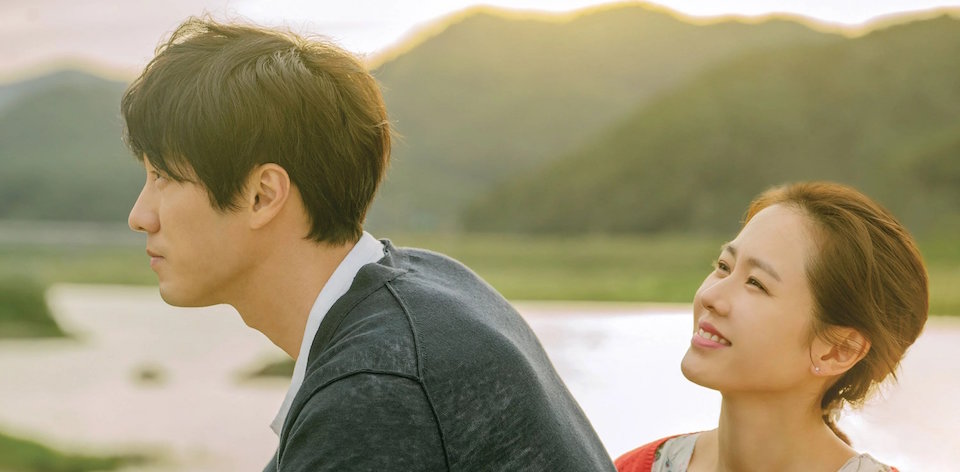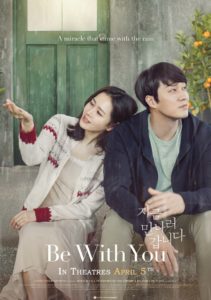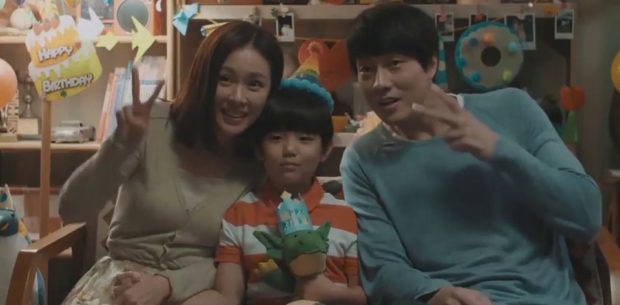Lee Jang-Hoon’s BE WITH YOU (지금 만나러 갑니다) marks the third time that Takuji Ichikawa’s 2003 novel has been brought to the screen. Nobuhiro Doi’s Japanese version was released in 2004, and followed rapidly in 2005 by a 10-part series on Japan’s TBS. The first Korean adaptation follows suit by setting its scene in 2006, and is a pretty faithful adaptation despite a few flourishes that push out the running time.
Kang Soo-Jine’s screenplay retains almost all of the basic story beats of the previous versions, but opens with a gorgeous piece of storybook animation. It follows a family of penguins in which the mother has to go to Cloudland, a “place between heaven and Earth,” but promises to return during the rainy season.
The film proper begins at the funeral of Soo-A (Son Ye-Jin), leaving her husband Woo-Jin (So Ji-Sub) to take care of their son Ji-Ho (Kim Ji-Hwan). As Woo-Jin struggles with a health condition that leaves him prone to fainting spells, the young boy believes his mother will keep her promise and come back on a rainy day one year later. In a moment straight out of fantasy, Soo-A actually returns as the rain begins to fall, but has no memory of her family.
While there’s a few cultural shifts, it’s surprising how much of Nobuhiro Doi’s film is still in the DNA of this version. Indeed, some of the camera choices are so similar that it’s almost more accurate to call this a remake rather than a new adaptation. Lee Jang-Hoon retains the leisurely pacing, allowing us to watch Soo-A and Woo-Jin to fall in love twice, both in the primary story and via a series of flashbacks. Yet Kang Soo-Jine also peppers with film with a lot more humour as well, from awkward first dances (resulting in a bloody nose) to Uncle Hong-Goo (Ko Chang-Seok) flailing about in a penguin costume. The constant score from Bang Jun-seok (Along with the Gods: The Two Worlds) lets you know when to switch from ennui to laughter.
Where the 2018 edition of BE WITH YOU really departs is in the characterisations. Son Ye-Jin’s take on Soo-A gives her a greater sense of agency, and as the film unravels, Kang Soo-Jine’s script gives her more to do than wait around for the inevitable. Her choice as to whether she “works or lurks” becomes a mantra. Ko Chang-Seok is a comedic sidekick of the first order, and it’s nice to see him in some lighthearted fare after appearances in last year’s A Taxi Driver and 1987: When The Day Comes. In Kim Ji-Hwan, they’ve found a kid who is just as adorable as Akashi Takei was in both Japanese adaptations.
If you’ve seen any of the versions that preceded this one, there will be few surprises in the emotionally manipulative climax. It is, after all, difficult to separate this from the fairly prominent adaptations in its native Japan. However, there’s also a timelessness to the magical realism that it plays with, mixing a kind of coming of age story with a meditation on grief and letting go. Bring a box of tissues, and if people spot you crying, just tell them it’s been raining on your face.
[stextbox id=”grey” bgcolor=”F2F2F2″ mleft=”5″ mright=”5″ image=”null”]![]() 2018 | South Korea | DIRECTOR: Lee Jang-Hoon | WRITERS: Kang Soo-Jine | CAST: Kang Soo-jine, Lee Jang-hoon, Kim Ji-hwan, Ko Chang-seok | DISTRIBUTOR: JBG Pictures (AUS) | RUNNING TIME: 131 minutes | RELEASE DATE: 5 April (AUS) [/stextbox]
2018 | South Korea | DIRECTOR: Lee Jang-Hoon | WRITERS: Kang Soo-Jine | CAST: Kang Soo-jine, Lee Jang-hoon, Kim Ji-hwan, Ko Chang-seok | DISTRIBUTOR: JBG Pictures (AUS) | RUNNING TIME: 131 minutes | RELEASE DATE: 5 April (AUS) [/stextbox]






